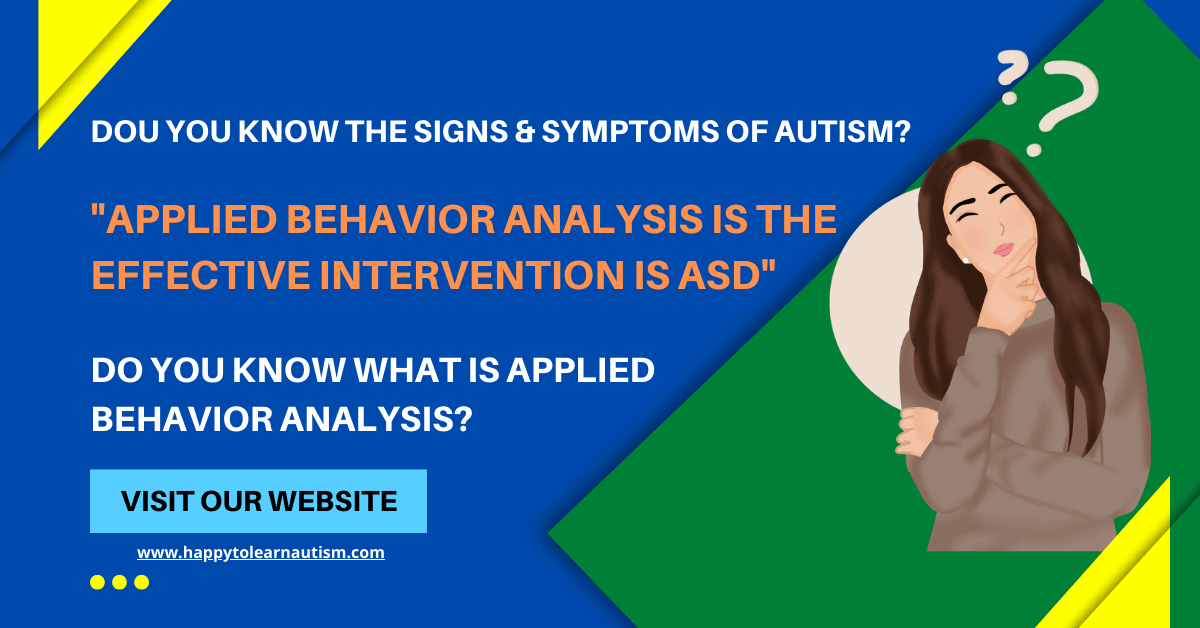Is your child’s behavior a sign to consider seeing an Aba Therapist near you?
Is your child’s behavior a sign to consider seeing an Aba Therapist near you?
Blog Article
Trick Indications and Signs And Symptoms to Identify in People With Behavior Autism
When you encounter someone with behavioral autism, recognizing key symptoms and signs is crucial. You might discover difficulties in social interactions and communication, in addition to a solid need for routines. Furthermore, sensory sensitivities can lead to frustrating experiences. Recognizing these traits can enhance your assistance and treatments, however there's more to uncover about how these behaviors show up in day-to-day scenarios. Let's explore what these signs truly appear like.
Obstacles in Social Communications
When you engage with somebody on the autism spectrum, you could discover they battle with social signs and communication. These difficulties can make social interactions feel overwhelming for them. You might see them preventing eye get in touch with or standing also close or also far throughout discussions, which can produce misunderstandings. They could not detect body language or faces, making it harder for them to gauge just how others are really feeling.
Additionally, you might locate that they like regimens and familiar setups, which can limit their determination to participate in new social situations. When they do involve, they might speak about their interests in fantastic information without noticing if you're interested. This can bring about one-sided conversations that leave you really feeling detached. Understanding these challenges can aid you approach interactions with compassion and patience, fostering a more comfy setting for both of you.
Difficulty With Verbal and Non-Verbal Communication

Identifying these indications is important, as it aids you much better support and engage with people on the autism spectrum. By recognizing their communication challenges, you can foster more meaningful links and supply a much more supportive setting.
Repetitive Habits and Routines
Interaction difficulties commonly go along with other signs of autism, such as repetitive habits and a solid choice for routines. You might discover that individuals with autism usually involve in certain, repetitive actions, like hand-flapping, shaking, or duplicating expressions. These actions can supply comfort and a feeling of control in an often frustrating globe.
When they adhere to a structured timetable,Routines are similarly important; lots of people grow. You may locate that changes to these routines can lead to substantial distress. If they have a day-to-day ritual of eating breakfast at a specific time or following a particular course to institution, any kind of disruption can cause anxiety.
Recognizing these patterns helps you understand their behavior and give assistance. By suiting their demand for routine and allowing repetitive activities, you can develop a much more comfortable environment that relieves their obstacles.
Sensory Sensitivities

Typical Sensory Triggers
Sensory sensitivities can considerably influence daily life for individuals with autism, as particular stimuli commonly set off frustrating responses. Common sensory triggers consist of loud sounds, bright lights, and strong scents. You might observe that sudden audios, like alarms or sirens, trigger anxiousness or distress. Fluorescent illumination in shops can feel severe and unpleasant. Structures can additionally play a considerable role; rough materials or specific food appearances may be intolerable for you. In addition, crowded places can bewilder your detects, making it tough to kick back or concentrate. Understanding these triggers can assist you handle your environment better. By being conscious of what influences you, you can take actions to minimize discomfort and enhance your day-to-day experiences.
Behavioral Feedbacks Clarified
Recognizing your behavior responses to sensory sensitivities is vital, as they typically reveal how you connect with the globe. You might notice that certain audios, lights, or structures overwhelm you, bring about anxiousness or pain. When confronted with these stimuli, you may withdraw, cover your ears, or perhaps react strongly. These responses aren't simply peculiarities; they're your way of handling overstimulation. You might also locate yourself looking for details sensory experiences, like deep stress or silent atmospheres, to aid ground on your own. Recognizing these patterns helps you recognize your web needs much better and can assist how you interact them to others. By recognizing your sensory sensitivities, you can work towards creating an environment that feels more manageable and comfy for you.
Coping Techniques Introduction
Identifying your sensory sensitivities is just the primary step; now it's time to check out coping approaches that can help you manage those experiences properly. Start by creating a sensory toolkit tailored to your requirements. This can include noise-canceling headphones, fidget playthings, or soothing aromas. Establishing an organized regimen can additionally give predictability, reducing anxiety around sensory overload. Take breaks in a silent area to collect yourself when you really feel overloaded. Exercising mindfulness techniques like deep breathing can help ground you in the moment. Furthermore, interact your needs with those around you; having encouraging pals and household can make a massive distinction. Remember, discovering what functions ideal for you may take time, so be open and patient to attempting new strategies.
Restricted Interests and Focus
While several people develop a large range of rate of interests, those with autism often show restricted interests and an extreme focus on specific subjects. You might notice that somebody with autism can invest hours diving into their see favorite topic, whether it's a particular kind of train, a specific movie, or a scientific idea. This intense emphasis isn't just a leisure activity; it can come to be a central component of their identification and social interactions.
You may find that conversations revolve around these passions, and they might have a hard time to engage in wider topics. By understanding and recognizing these limited interests, you can promote a supportive atmosphere where they feel valued and understood, permitting for more significant connections and communications.
Emotional Regulation Problems
Individuals with autism frequently face difficulties in psychological regulation, which can be affected by their intense concentrate on certain passions. You might observe that when a person is deeply participated in a recommended activity, they can experience strong feelings, whether excitement or disappointment. When things don't go as prepared., this strength sometimes makes it hard for them to change gears or handle their feelings - Aba Therapist Near Me.

Irregularity in Developing Turning Points
When it comes to developmental landmarks, you'll notice that people with autism typically show a large range of variability. You could see a youngster excel in language skills but struggle with social communications.
It's necessary to acknowledge that each person's journey is distinct. Observing these patterns can help you recognize their staminas and requires better.
Regularly Asked Concerns
Exactly How Is Autism Diagnosed in Children and Adults?
To diagnose autism in children and click resources adults, experts assess actions, communication abilities, and social interactions. If a specific satisfies the standards for autism spectrum disorder., they frequently make use of standardized tests, meetings, and monitorings to establish.
Exist Different Kinds Of Autism Range Disorders?
Yes, there are different kinds of autism range conditions, including Asperger's disorder and pervasive developmental disorder-not or else specified. Each kind varies in extent and attributes, so recognizing these differences can aid you much better assistance people with autism.
What Treatments Are Efficient for Individuals With Autism?
When thinking about efficient treatments for individuals with autism, you'll find alternatives like Applied Habits Evaluation, speech therapy, and work-related therapy. Each strategy can help enhance communication, social abilities, and day-to-day functioning tailored to specific demands.
Can People With Autism Lead Independent Lives?
Yes, people with autism can lead independent lives. With the right assistance, skills training, and sources, you can aid them develop self-sufficiency, take care of everyday jobs, and grow in numerous environments, promoting their independence.
Exactly How Can Households Support Enjoyed Ones With Autism?
You can sustain your enjoyed ones with autism by producing an organized environment, urging their interests, practicing patience, fostering communication, and promoting social abilities. Commemorate their achievements, regardless of exactly how little, and build a supportive community.
Although lots of people on the autism range can recognize and utilize language, they usually encounter considerable challenges with both non-verbal and verbal interaction. Acknowledging these indications is necessary, as it assists you better assistance and engage with individuals on the autism range. You might notice that individuals with autism typically engage in details, repeated actions, like hand-flapping, rocking, or repeating phrases.Sensory level of sensitivities can substantially influence daily life for people with autism, as specific stimuli typically cause frustrating reactions.When it comes to developmental turning points, you'll observe that individuals with autism often reveal a large array of variability.
Report this page